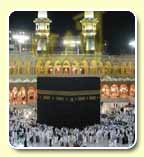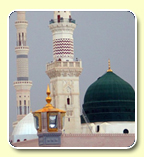|
|
 |
| |
| |
 |
According to the Islamic law (Sharia), Hajj means intending the holy Ka'aba to perform specific rites. Linguistically, Umrah means the visit. It is so called because it can be performed throughout the lifetime. According to the Islamic law (Sharia), Umrah is heading for the holy Ka'aba to perform the religious rites. Hajj is the fifth pillar of Islam that Allah the Exalted imposed upon those who can able to perform it. The order comes from Allah in the Quranic verse: "Hajj (Pilgrimage) to the House (the Ka'aba) is an obligation that humanity owes to Allah, for those who can find a way (i.e. for those who can find the means to do it). And whoever disbelieves (i.e. denies the Hajj), then Allah is beyond any need of all that exists (from His creation)" [Aal 'Imran: 197], and His order in the verse: "The Hajj is in the well-known (lunar) months. |
|
|
| |
So whoever intends to perform Hajj in these months, then he should not have sexual relations (with his wife), nor commit sin, nor argue unjustly during the Hajj" [Al-Baqarah: 197], and in His order; "Complete (perform properly) the Hajj and 'Umrah for the sake of Allah" [Al-Baqarah: 196). From these Quranic verses we can Read more |
|
|
|
|
|
|
|
|
The conditions of Hajj and Umrah |
|
| |
| |
 |
Hajj is obligatory upon those who have fulfilled the following conditions:
(1) Islam; Hajj is not imposed upon the disbeliever because as for him it is invalid; so that if a disbeliever performed Hajj and embraced Islam later, he has to perform Hajj again.
(2) Maturity (legal age-reason). Hajj is not imposed upon those who are under the legal age or upon the mad. But it would be accepted from children if they did.
(3) Freedom. Hajj is not imposed upon slaves.
(4) The capacity which includes; Physical and Financial ability, Availability of the means of transportation, water and food,
|
|
|
| |
(5) Safety
(6) Husband, Mahram or trustworthy women accompanying the women
(7) The women should not be under iddah (waiting period) due to a divorce or death of their husbands. Read more |
|
|
|
|
|
| |
|
|
| |
Etiquette and types of Ihram |
|
| |
| |
 |
It is desirable upon the pilgrim before Ihram the following:-trimming his moustache, cutting short his hair, clipping his finger nails, take a bath with the intention of Ihram, using perfume only in the body, wearing two new and neat white cloths. After offering a two rak'ah of voluntary prayer for Ihram, he should supplicate to Almighty for showering the blessings of here and hereafter. When he is restarting the journey to holy Makkah, he should declare his intention to perform Hajj, or 'Umrah. The intention is an essential part of Hajj and Umrah. As soon as he enters the state of ihram, it is preferable upon the pilgrim to utter Talbiyah loudly until starting to throw the stone at Jamrah Aqabah after the midnight of Dulhijja 10. |
|
|
| |
Prohibitions of Ihram
While in a state of ihram, a person must avoid sexual intercourse and all things that lead to it. He must avoid getting married or joining others in marriage. A 'Muhrim' (one who entered in Hajj or Umrah) must not wear any sewn clothes or shoes that cover his finger or ankle. He must not cover his head, nor use any perfume Read more |
|
|
|
|
|
| |
|
| |
The places of Ihram (Miqath) |
|
| |
| |
 |
As far as 'Ihram' is concerned the Messenger of Allah (peace be upon him) has assigned on all the four sides of holy Makkah, some distinct places where Ihram (intention to perform Hajj or Umrah) becomes obligatory for the pilgrims to holy Makkah. Linguistically Miqath means the limit. According to the Islamic law (Sharia), Miqath is a specific time or place for a specific worship. The specific time is Shawwal, Dulqa'da and ten days of Dulhijja for Hajj. There is no any particular time for Umrah but it can be done throughout the year. A pilgrim who intended to perform Hajj or Umrah is not allowed to pass over a Miqath without assuming Ihram, but it would be acceptable even before reaching the Miqath. |
|
|
| |
Fixation of specified places for Ihram has been narrated in authentic traditions of the Holy Prophet (PBH). Even though the Ihram at or before Miqath is obligatory only upon those who are intending to perform Hajj or Umrah, but it is desirable (Musthahabb) for those who are crossing over Miqath to go holy Makkah for some commercial purposes or Read more |
|
|
|
|
|
| |
|
|
|

